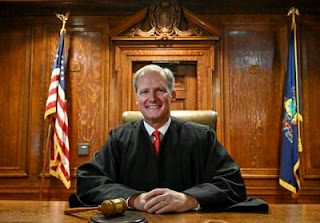Since the effective date of the Fair Share Act over a decade ago, the act has been applied in Pennsylvania without much controversy. Then, in dicta found in the Pennsylvania Superior Court’s decision from last year in the case of
, 249 A.3d 529 (Pa. Super. 2021), that court raised, on a seemingly
basis, the proposition that the Fair Share Act should not apply in cases involving innocent victim plaintiffs.
Examples of cases where a plaintiff may be an innocent victim include cases where a plaintiff is a guest passenger in a vehicle involved in an accident, or cases where a plaintiff struck while walking in the crosswalk with the pedestrian light in his favor, or a in claims involving plaintiffs who are the victims of negligent medical care while under anesthesia. As such, this
could come into play in a number of scenarios going forward.
While in English Literature, as per poet Gertrude Stein, “a rose is a rose is a rose,” in the law, at least up until recently,
. It seems that the unfortunate and troublesome liberalization of the meaning and scope of previously concrete terms and tenets that is becoming more and more common in society in this day and age is spilling over into the jurisprudence of Pennsylvania law, including with regards to the concept of
.
In this regard, the notion that the Fair Share Act does not apply when an injured party plaintiff is an innocent victim of the negligence of another seems to be gaining steam in recent several state and federal court decisions despite the fact that this notion is based upon
decision. More specifically, certain court decisions referencing the
as amounting to a “holding” on the issue of whether the Fair Share Act applies to innocent plaintiffs. This is made more troublesome by the possibility that the
case was wrongly decided.
The Fair Share ActUnder the “old” rule of joint and several liability that existed before the 2011 effective date of the current Fair Share Act, if any defendant was found to be even only 1% responsible for causing an accident, that defendant could be compelled to pay the entire verdict (and to, thereafter, seek a reimbursement of its overpayment from any other responsible co-defendant). This rule of law applied regardless of whether a plaintiff was an innocent victim or not.
Under the Fair Share Act, found under the amended 42 Pa.C.S.A. Section 7102, it became Pennsylvania law in 2011 that each defendant would instead only be responsible to pay their “fair share,” that is, the percentage of the verdict that a jury had assessed to that defendant.
There were specific exceptions written into the law by the General Assembly. If any one defendant was found to be 60% or more responsible for the happening of an accident, then that defendant would be responsible to pay the entire verdict (and to, thereafter, be able seek a reimbursement of its overpayment from any other responsible co-defendant).
There are also other express exceptions written into the Fair Share Act by the legislature as well, including an exception in cases involving dram shop claims, to name another one.
‘Spencer v. Johnson’
From 2011 forward, the Fair Share Act was applied for a decade without much controversy. That all changed with the Pennsylvania Superior Court’s decision in the case of Spencer v. Johnson, 249 A.3d 529 (Pa. Super. 2021). In Spencer, an innocent plaintiff pedestrian alleged personal injuries as a result of being struck by a vehicle while the plaintiff was crossing the street within a crosswalk. The case involved three defendants.
The issue on appeal in this case focused on the extent to which a plaintiff could request that the percentages of different defendants could be added together, under theories of vicarious liability, in order that a plaintiff may come up with a combined amount of a 60% percentage of liability that could thereby allow a plaintiff to potentially be in a position to compel a deep pocket defendant to pay the entire verdict under the 60% exception found under the Fair Share Act.
Over the first approximately 26 pages of the Superior Court’s opinion in Spencer, the court accepted the plaintiff’s argument that the employee defendant’s negligence should be imputed to the defendant employer’s negligence because the defendant employee was acting within the scope and course of her employment with the employer at the time of the accident. The Superior Court reversed and remanded the case to the trial court for further proceedings with regard to a molding of the verdict in terms of the percentages of responsibility. The above decision represented the holding of the Spencer court in this case. One would think that, with the issue before the court having been decided, the court’s opinion would end at that point.
But the Pennsylvania Superior Court in Spencer was apparently not finished with its opinion in the case before it. Rather, on a seemingly sua sponte basis, the appellate court went on to note, “assuming arguendo,” that is, assuming for the sake of argument, that a different set of hypothetical facts applied, the court would have gone on to decide additional issues that were not then before the court. In other words, the court was offering up dicta.
More specifically, the court in Spencer raised the hypothetical of a different situation, that being of a defendant employer who was found by the jury not to be vicariously liable for the actions of its employee such that those defendants were instead required to be treated separately. The court in Spencer noted in this dicta, that, under that different scenario (which was not before that court), the Fair Share Act would not have applied because, according to the Spencer court, the Fair Share Act only applied to cases in which the plaintiff’s comparative negligence was an issue in the case, that is, cases where the plaintiff was assessed a percentage of responsibility for causing his own accident. Stated otherwise, in its sua sponte dicta, the court in Spencer stated that the Fair Share Act was not applicable in cases involving innocent plaintiffs.
Is the ‘Spencer’ Dicta Even Valid?
In addition to these additional superfluous statements by the court in Spencer amounting to dicta, questions also remain as to the validity of that court’s notion that the legislature intended that the Fair Share Act not apply to innocent plaintiffs. The Spencer court stated that, in its reading of the history and structure of the Fair Share Act, the court found “no indication that the legislature intended to make universal changes to the concept of joint and several liability” in cases involving innocent plaintiffs.
Yet, there can be no question that the legislature did make universal changes to the concept of joint and several liability with the passage of the Fair Share Act. Prior to the act, any defendant found to be 1% responsible for a plaintiff’s injuries, could be made to pay the entire verdict. After the passage of the Fair Share Act, each defendant, unless they were found to be 60% or more liable, would only have to pay their percentage share of the verdict. The old rule of liability was turned upside down and eradicated across the board by the new Fair Share Act.
Why would the legislature pass a “Fair Share” Act to apply to personal injury matters but still intend to require a defendant found only 1% liable to be unfairly responsible to pay the entire verdict simply because a plaintiff was not found to be negligent?
Also, as noted, the General Assembly wrote several express exceptions into the actual wording of the Fair Share Act. It therefore stands to reason that, if the legislature wanted to carve out another exception applicable to cases involving innocent plaintiffs, the General Assembly would have expressly written such an exception into the Fair Share Act to join the other exception already contained in the act.
The rhetorical question becomes, if the legislature did not expressly write such an exception into the act, is it the place of the courts to do so?
In part two of this article, I will discuss the loose language of dicta and whether change is on the horizon.
Part Two of the Article (published August 4, 2022)
As discussed in part one of this article, since the effective date of the Fair Share Act over a decade ago, the act has been applied in Pennsylvania without much controversy. Then, in
dicta found in the Pennsylvania Superior Court’s decision from last year in the case of
Spencer v. Johnson, 249 A.3d 529 (Pa. Super. 2021), that court raised, on a seemingly
sua sponte basis, the proposition that the Fair Share Act should not apply in cases involving innocent victim plaintiffs.
In this regard, the notion that the Fair Share Act does not apply when an injured party plaintiff is an innocent victim of the negligence of another seems to be gaining steam in recent several state and federal court decisions despite the fact that this notion is based upon
dicta initially espoused in the
Spencer decision.
In part two of this article, I will discuss the loose language of
dicta and whether change is on the horizon.
Loose Language Morphing Dicta Into a ‘Holding’?
Despite the questionable validity of the dicta of the
Spencer v. Johnson case in this regard, judges in more recent decisions have referred to the
dicta found in
Spencer regarding the alleged inapplicability of the Fair Share Act to cases involving innocent plaintiffs as a “holding” of the
Spencer court.
In the case of
Snyder v. Hunt, 268 A.3d 416 (Table)(Pa.Super. 2021), an unpublished decision, a different panel of the Pennsylvania Superior Court than that in the
Spencer case addressed issues raised on appeal from a nonsuit entered in favor of the defendants in a trip-and-fall case.
Of note, on appeal, the Pennsylvania Superior Court remanded the case back down to the trial court for further trial proceedings against certain defendants, some of whom had not appeared for the first trial. With regards to those defendants, the appellate court noted that, under Spencer, since those defendants had not alleged, or offered proof, as to any negligence on the part of the plaintiff, “the Fair Share Act, 42 Pa.C.S.A. Section 7102, [did] not shield them from the common law of joint and several liability under
Spencer.”
In this regard, the court in
Snyder specifically cited to the
Spencer decision and, in a parenthetical attached to that citation, described the
Spencer decision as “holding that ‘there is no indication the legislature intended to make universal changes to the concept of joint and several liability outside of cases where a plaintiff has been found to be contributorily negligent.’”
It may never be known if the use of the term “holding” to describe this portion of the
Spencer decision was intentional by the Pennsylvania Superior Court in
Snyder or, rather, a simple, casual reference to the decision for purposes of including a parenthetical in the citation. Regardless, members of the plaintiff’s bar are sure to continue to pounce on the same in an effort to turn the
dicta of the
Spencer decision into precedential law going forward.
The possible migration of the
dicta at issue in the
Spencer case towards a precedential holding has also been exhibited in the recent federal court case of
Anderson v. Motorists Mutual Insurance, No. 2:21-CV-00493-CCW (W.D. Pa. June 22, 2022 Wiegand, J.).
A Bold Prediction Based on Dicta In the
Anderson case, the court addressed the issue raised as to the amount of the credit to which the UIM carrier was entitled in a personal injury matter. As part of the analysis the court addressed novel arguments raised under the Fair Share Act.
After the accident, the plaintiffs sued the third party tortfeasor and settled those claims. The plaintiffs then filed a claim for UIM benefits with Motorists Mutual.
Motorists Mutual, as the UIM carrier, denied the plaintiff’s claim on the basis that the value of the claim did not exceed the combined $5.1 million liability limits of the various third party tortfeasors.
In this
Anderson case, the plaintiff was seeking a partial summary judgment under an argument that, unless Motorists Mutual could prove that the trucking defendants’ percentage of fault equaled or exceeded 60%, Motorists Mutual should only be entitled to a credit equal only to the amount the plaintiff was legally entitled to recover from the joint tortfeasors, that is, the sum of the lesser amounts actually paid in settlement on the third party side by the operator of the vehicle in which the plaintiff is located and the trucking defendants. The plaintiff asserted that, if the UIM carrier was unable to establish this proof, then the UIM carrier should only be entitled to a credit of the amount paid pursuant to the settlements because the plaintiff would have been unable to recover the full amount of damages from the trucking defendants because the 60% exception to the Pennsylvania Fair Share Act was not met.
The court applied Pennsylvania law and noted that there was no controlling Pennsylvania Supreme Court precedent on the issue of the enforcement of exhaustion clauses concerning UIM benefits. However, it was noted that the Pennsylvania Superior Court had decided a number of cases in this regard, including the case of
Boyle v. Erie in which the Superior Court held that a UIM carrier was entitled to the full amount of any liability limits that were available on the third party side.
The plaintiff attempted to assert that the
Boyle decision was inapplicable, in part, due to the underlying policy concerns and
Boyle being no longer applicable due to the passage of the Pennsylvania Fair Share Act.
The court in this
Anderson case held that it did not need to decide whether the Pennsylvania Fair Share Act altered
Boyle’s holding. In
dicta, the court in
Anderson more specifically stated that, even assuming that the enactment of the Pennsylvania Fair Share Act served to alter
Boyle’s holding, the plaintiff’s argument still failed because “it is not clear that the Pennsylvania Fair Share Act applies where the plaintiff’s negligence is not in question, as is the case here.”
In this regard, the court in this matter pointed to the case of
Spencer v. Johnson, 249 A.3d 529 (Pa. Super. 2021). The court in this
Anderson case stated that, in the
Spencer case, the Pennsylvania Superior Court had found, “as an alternative holding,” that for the “Fair Share Act to apply, the plaintiff’s negligence must be an issue in the case.”
The court in
Anderson additionally pointed to the above-referenced case of
Snyder v. Hunt in support of this proposition as well.
Notably, the court in this
Anderson case boldly, and perhaps incorrectly, predicted that, if faced with this issue, “because the decedent’s negligence is not at issue in this case, the Pennsylvania Supreme Court would find that the Fair Share Act does not apply in cases such as this one, where the plaintiff’s negligence is not an issue, and, as a result, that the traditional principles of joint and several liability would control.”
Under this analysis, the court in
Anderson held that it did not need to decide whether the Fair Share Act altered
Boyle’s holding. The
Anderson court went on to find that the language of the exhaustion clause in this case compelled the court to rule that the UIM carrier was indeed entitled to a credit for the full amount of the liability limits available in the underlying third party case.
Is Change on the Horizon, or a Correction? As noted, the first decade of the life of the Fair Share Act was largely without controversy until the Pennsylvania Superior Court’s
sua sponte dicta in the case of
Spencer v. Johnson unfortunately came along.
It remains to be seen whether any future court, squarely faced with this issue, would ultimately validate the dicta of the
Spencer court or would, instead, leave the legislating to the legislature and rule that, if the General Assembly intended that the Fair Share Act not apply to innocent plaintiffs, then such an exception would have been specifically written into the act.
In the meantime, in light of the controversy created by the
dicta in the
Spencer v. Johnson decision, litigants and the trial courts are now unfortunately left to struggle over the scope and ambit of the previously clear terms of the Fair Share Act until concrete appellate guidance is otherwise provided.
Daniel E. Cummins is the managing partner of the Clarks Summit law firm of Cummins Law, a civil litigation practice. He also conducts mediations of civil litigation matters through Cummins Mediation Services. Cummins is also the sole creator and writer of the Tort Talk Blog (www.TortTalk.com), which is designed to provide continuing updates on important cases and trends in Pennsylvania civil litigation law. He can be reached at dancummins@CumminsLaw.net. 






























